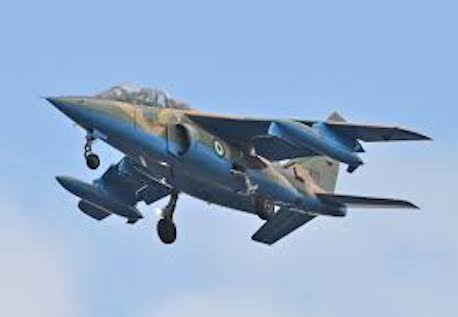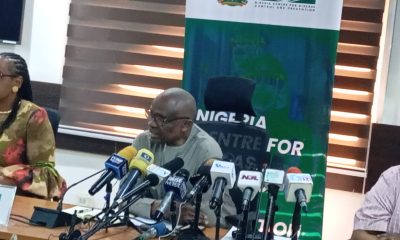DEFENCE
We’ve Assisted 18,000 Nigerian Returnees in 20 Years, Says IOM Chief

The International Organisation on Migration (IOM) on Thursday says it has assisted no fewer than 18,000 Nigeria returnees towards reintegrating them into the society.
Mr Franz Celestine, the Chief of Mission, IOM, Nigeria disclosed this at the 20th anniversary of the organisation in Nigeria.
Celestine said that the figure was from the 22,000 the organisation had helped to return back to the country since its operations in Nigeria 20 years ago.
He explained that those assisted were assisted in areas based on their needs, such as the livelihood sector, education sector, among others.
He attributed the success in that regard to working with the communities, individuals, government, and traditional rulers.
According to him, we take a whole lot of society approach to the reintegration process to ensure that no one is left behind.
The Chief of Mission also revealed that the organisation started its operations in the country with just two desks, adding that 20 years after the staff strength had increased to more than 1,500.
“That is the testament to IOM calling and the work that we do as well as the needs that exist.
“The number of people we provide support to is extremely important”, he said.
He further said that the IOM had experienced upward projection in terms of relationship with government.
“Similarly we have experienced upward projection in our ability to provide services, and strength of staff to do what was necessary to provide life sustaining and life saving support to the needy”.
Speaking on how the organisation weathered the storm during the outbreak of the COVID-19 pandemic.
Celestine said that the pandemic brought the whole global challenges to the fore.
He noted that in view of this, the IOM donors stepped up, and the organisation saw increase in it’s funding by 25 per cent in 2020 from what it was in 2019.
“The donors stepped up because they saw a need and came to provide that support, because it was then that everybody needed to step forward and put hands on deck to fight the pandemic.
“IOM had a comprehensive approach looking at the needs of the people, looking at the psychosocial support need and the economic side effect of the virus.
“And so we were able to have a multiple approach to respond to the virus.
“This however was not only from the pharmaceutical measures, but the non pharmaceutical measures that allow the organisation to perform and provide the life saving services”, he added.
Similarly, Mrs Ugochi Daniels, Deputy Director General for Operations, IOM said that with migration, the organisation had been very much involved with helping and having proper documentation and screening that was needed.
Daniels also said that the organisation had also been helping with irregular migration and returning people back to the country and helping them re-establish their lives, as well as helping with humanitarian services especially in the North East.
She noted that the major constraint by the IOM was funding to meet what the needs of the returnees were.
“But we have tried our very best with the funding that we have”.
She also noted that the present security situation in the country was another major challenge.
She however expressed optimism that in the next 20 years, the IOM would have been able to give more people hope that once they return back to the country, life was not over.
“That they can be established in the society, and not just re-establish but they can go on with their lives and have very productive lives and satisfactorily take care of their families.
“What we want is a prosperous, healthy Nigeria”, she said.
There were testimonies from some of the returnees, like Miss Aimalohi Adoga, who said she just finished her NYSC scheme and had been called to bar.
According to her, she voluntarily approached the IOM after going through emotional, physical and mental torture as a help in Libya.
She disclosed that IOM saw her through her remaining years in school and law school, after returning her to Nigeria. (NAN)
DEFENCE
Army Destroys 22 Lakurawa Camps, Recover Arms in Sokoto, Kebbi

The special brigade of the Nigerian Army has neutralised scores of Lukurawa bandits and destroyed about 22 camps in Sokoto and Kebbi states.
The Theatre Commander of Operation FANSAN YAMMA, Maj.- Gen. Oluyinka Soyele, disclosed this to the newsmen on Friday in Sokoto.
Speaking through the Acting General Officer Commanding (GOC), 8 Division of Nigerian Army Sokoto, Brig.
Gen. Ibikunle Ajose, Soyele said the special operation brigade was deployed by the Chief of Defense Staff, Gen. Christopher Musa for the exercise.He noted that the successes were recorded through a fresh onslaughts lunched against Lakurawa bandits that led to the destruction of bandits camps.
Soyele said that the operation was to consolidate successes achieved in the ongoing operation under ” FOREST SANITY III CHASE LAKURAWAS OUT. ”
He charged the troops to ensure total destruction of the Lakurawas sects and enjoined them to abide by the rules of engagement and ensure the protection of lives and properties of law abiding citizens.
Soyele further highlighted that troops have been selected and trained for this mission, hence Nigerians are counting on their ability and professionalism to flush out the Lakurawas.
He added that the special operation was to ensure total elimination of the Lakurawas sects in Sokoto and Kebbi states.
He explained that the operation reached forests and enclaves at Rumji Dutse East of Sarma, Tsauna and Bauni, Malgatawa, Gargao, Tsauna and Magara forests in Kebbi state.
Other areas raided included; Kaideji, Nakuru, Sama, Sanyinna, Kadidda, Kolo and Dancha villages in Illela, Tangaza and Binji local government areas of Sokoto state.
The operation, he said led to the recovery of four rifles and 409 PKT 7.62mm NATO and 94 pieces of 7.62mm special rounds ammunition besides destruction of about 22 camps, neutralization of several members of the sect members.
He stressed that the deployment of the brigade would be an added impetus in frustrating the activities of the bandits and restoring normalcy to the affected communities and the Northwest states.
Soyele added that prior to the deployment of the Brigade, troops of 8 Division under Operation FANSAN YAMMA had begun precursor and shaping the areas. (NAN)
DEFENCE
Army Destroys Bandits Camps, Recover Ammunition in Taraba

The troops of 6 Brigade, Sector 3 of Operation Whirl Stroke (OPWS), have destroyed several bandits camps and recovered ammunition in Taraba.This is contained in a statement on Sunday in Jalingo signed by Capt. Olubodunde Oni, Acting Assistant Director Army Public Relations.It said the successes were recorded in a series of clearance operations under Commander of the Brigade, Brig.
Gen. Kingsley Uwa, across multiple bandits hideouts in Taraba. “The operation code named OP GOLDEN PEACE commenced after extensive confidence building patrols, clearance missions, and stakeholder engagements, which proved effective in the northern part of the state.“The latest phase of the operation began on 28 November 2024 in Takum Local Government Area (LGA), focusing on known bandit and terrorist hideouts around Lijam High Ground.”The statement indicated that during the operations, several bandit camps were destroyed, and troops recovered 27 rounds of 7.62mm special ammunition, one AK 47 Magazine, one handheld Baofeng radio and 2 motorcycles.“To further solidify the safety of residents, troops projected force into the Akume and Ananum areas of Donga LGA on 30 November 2024, reinforcing the Brigade’s commitment to securing lives and property throughout Taraba State.”The statement quoted the Commander of the 6 Brigade who commended the troops, urging them to remain vigilant.“Together, we will ensure peace and security across Taraba State and beyond.“This is our determined effort to ensure a safe and secure environment for the ongoing farm harvest season and the forthcoming yuletide and to ensure that the state does not become a safe haven for criminals,” the commander is quoted as saying.(NAN)DEFENCE
Cybersecurity Bedrock of NAF’s Operational Readiness – CAS

The Chief of the Air Staff (CAS), Air Marshal Hasan Abubakar, says cybersecurity is the bedrock of operational readiness and the key to mission success of the Nigerian Air Force (NAF).
Abubakar said this on Tuesday in Abuja, at the opening of NAF’s Cybersecurity Awareness Training.
He said the training was a vital initiative that would highlight the future of national security in the increasingly interconnected world, where artificial intelligence and advanced technologies play pivotal roles.
According to him, the integration of technology into warfare has ushered in a new era where digital bits and bytes are as formidable as physical bullets and bombs.
“The integrity of our nation’s defence systems, the security of our communications, and the sanctity of our data depend on the strength and resilience of our cybersecurity framework.
“For the NAF, which has distinguished itself as being more technological advanced than other services, cybersecurity is not just an IT concern; it is the bedrock of our operational readiness and the key to mission success.”
The CAS also said that the workshop would serve as a vital part of NAF’s efforts at ensuring that its personnel were equipped to meet the demands of securing the nation’s collective cyber environment.
He added that the recent global events had highlighted the severe consequences of cyberattacks, which could disrupt critical operations and undermine national security.
He disclosed that NAF’s platforms depended on secure digital communications, making them vulnerable to potential hijacking or operational disruptions.
According to him, these vulnerabilities emphasise the urgent need for a proactive and robust approach to cybersecurity within our ranks, which is precisely the focus of our gathering here today.
“Cybersecurity is a continuous journey that demands vigilance, ethical conduct, and a commitment to protecting our nation’s digital infrastructure.
“Let us continue to build a resilient cybersecurity posture that will enable us to stand ready against any threat, known or unknown that may arise in the digital age.”
In his remarks, the Chief of Communications and Information System, NAF, AVM Suleiman Usman, said the training was designed to equipped personnel with the necessary knowledge and tools to protect both physical borders and digital frontiers.
Usman explained that the training had dominated CAS’ strategic intent to develop and sustain optimal operational effectiveness in the NAF.
He said the cybersecurity training was an essential part of their collective mission to secure the integrity of NAF’s information networks.
“Cyber threats are more sophisticated than ever, hence the need for robust and resilient cybersecurity measures against evolving threats becomes ostensible.
“We are not just guarding the airspace but also protecting data, communications and systems that are integral to the success of every mission we undertake,” he said.
In his lecture titled, “Global Trends and Pillars of Cybersecurity for NAF”, Dr Asogbon Godwin, said that NAF must develop comprehensive cyber security policies and laws that addressed various types of cybercrimes.
He said that the cybercrimes include hacking, identity theft, phishing, and malware attacks.
Godwin urged the air force to invest in raising awareness about cybercrime risks and best practices for staying safe online and training investigators and prosecutors on digital forensics and other technical skills needed to investigate cybercrimes.
He also advised NAF to void ‘Bring Your Own Device (BYOD) police and also practice Zero Trust Principle.(NAN)
































